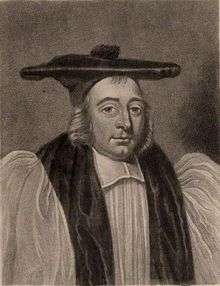Nicholas Monck
| The Right Reverend Nicholas Monck | |
|---|---|
| Bishop of Hereford | |
 | |
| Church | Church of England |
| Diocese | Diocese of London |
| Installed | 1660 |
| Predecessor | Vacant |
| Successor | Herbert Croft |
| Other posts | Provost of Eton |
| Orders | |
| Ordination | 1 December 1660 |
| Consecration | 6 January 1660-1 |
| Personal details | |
| Born |
c. 1610 Potheridge, Merton, Devon |
| Died | 17 December 1661 |
| Nationality | British |
| Denomination | Anglican |
| Spouse | Susannah Payne |
| Alma mater | Wadham College, Oxford |
Nicholas Monck (c. 1610 – 7 December 1661) was bishop of Hereford and provost of Eton.
Life
He was the third son of Sir Thomas Monck, knt., of Potheridge, Devonshire, and younger brother to George Monck, 1st Duke of Albemarle, the famous general. He was born at Potheridge in 1610, and in 1629 matriculated at Wadham College, Oxford. He graduated B. A. on 3 March 1630-1, and M. A. on 30 October 1633. [1]
Instead of entering the army like his brothers, he took holy orders. The small living of Plymtree in Devonshire, which he obtained after 1646 through his marriage in 1642 with the daughter of the then rector, whose family had the presentation, was confirmed to him by General Monck's influence with Cromwell; but his sympathies certainly leaned to the royalist side, and he was in 1653 presented by his kinsman, Sir John Granville, 1st Earl of Bath, to the valuable living of Kilhampton, Cornwall, worth about £260 a year.[1]
After Cromwell's death Grenville sent 'the honest clergyman' up to London, where he received through George Monck's brother-in-law, Thomas Clarges, instructions to go to Scotland and ascertain his brother's intentions. Nicholas therefore sailed for Edinburgh, in August 1659, on the ostensible errand of arranging a marriage for one of his daughters. He found the general engaged with a council of officers, but confided his mission to the general's chaplain, John Price, who was in the confidence of the royalist party. From Price, Monck received every encouragement. The next day the brothers met, and various accounts are given of their interview, but all agree that the general refused to commit himself as to his future conduct.[1]
After the Restoration, Nicholas was made provost of Eton, on the recommendation of Granville. There was no pretence of election on the part of the fellows, who, much incensed by Charles's arbitrary proceeding, refused to make an entry of the appointment in the college register. A copy of the royal letter, dated 7 July 1660, nominating Monck is extant in the Eton Library. Most of the puritan fellows resigned or were ejected, and 'new regulations were drawn up by the new provost and fellows, the former's stipend being fixed at £500 a year, besides 'wood, capons, 20 dozen of candles, and 20 loads of hay.' On 1 August 1660 Nicholas was created D.D. at Oxford, and on 1 December, he was appointed bishop of Hereford, a see which had been vacant fourteen years. He was to hold his provostship in addition for two years. Consecrated on 6 January 1660-1 in Westminster Abbey by the Archbishop of York, he lived to enjoy his new dignity only for eleven months. [1]
He died on 17 December 1661, aged 51, at his lodgings in Old Palace Yard, and was buried on the 20th in Westminster Abbey, his brother George attending the funeral as chief mourner.[1]
Family
By his wife Susannah, daughter of Thomas Payne, rector of Plymtree, Devonshire, and widow of Christopher Trosse, whom he married in 1642, Nicholas had two daughters, Mary, married to Arthur Fairwell of Westminster, and Elizabeth, married to Curwen Rawlinson of Carke Hall, Cartmell, Lancashire. A son Nicholas died young. On the daughter Elizabeth's monument, put up by her son Christopher Rawlinson at St. Mary's Church, Cartmell, Nicholas is described as 'a great assistant in the Restoration to his brother.' In 1723, Christopher Rawlinson erected a pyramidical monument of black and white marble to the bishop in St. Edmund's Chapel, Westminster Abbey. [1]
References
- Attribution
![]() This article incorporates text from a publication now in the public domain: Bradley, Emily Tennyson (1894). "Monck, Nicholas". In Lee, Sidney. Dictionary of National Biography. 38. London: Smith, Elder & Co.
This article incorporates text from a publication now in the public domain: Bradley, Emily Tennyson (1894). "Monck, Nicholas". In Lee, Sidney. Dictionary of National Biography. 38. London: Smith, Elder & Co.
Sources
- Knighton, C. S. (September 2004). "Monck, Nicholas (c.1610–1661)". Oxford Dictionary of National Biography. Oxford University Press.
| Church of England titles | ||
|---|---|---|
| Vacant Title last held by George Coke |
Bishop of Hereford 1660–1661 |
Succeeded by Herbert Croft |